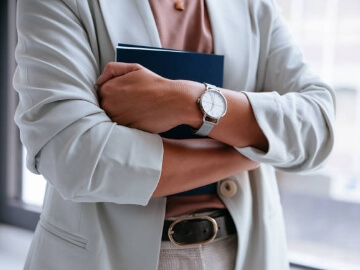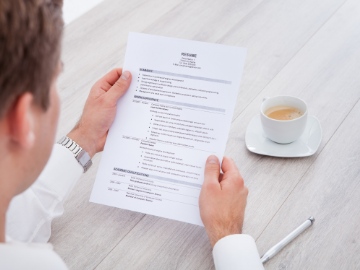5 Unique Thank You Emails After Interview: Best Tips & Etiquette

At last, you've finished the interview for your dream job. Now, you're thinking about sending a thank you email after the interview, but you're unsure what to say. What should you include? What's the best way to express appreciation, and what should you avoid?
This guide offers five unique thank you email examples, along with a few best tips and etiquette to help you follow up professionally and leave a strong impression.
Why should you send a thank you email after an interview?
Sending a thank-you email after an interview is not required, but it can be a valuable interview follow-up in the hiring process. It shows respect for the interviewer's time and reinforces your interest in the role.
It can also help you stand out in your job search. Nearly one-third of professionals say they don't send a thank-you email after every interview, and many candidates (7%) say they never send one. Taking the time to follow up can make a difference.
Career experts say that sending a thank you email after an interview shows "professional courtesy" and gives you a chance to "offer information that can make you a stronger candidate." You can clarify anything from the interview, highlight your key skills, and keep your name top of mind as the hiring manager makes a decision.
5 unique thank you email after an interview examples
If you want to send a thank-you email after the interview process and grow your professional network, here are 5 post-interview thank-you email samples you can use.
-
Standard corporate thank-you (for a marketing role)
Subject: Thank you - marketing associate interview
Dear Ms. Rivera,
Thank you for the opportunity to speak with you yesterday about the Marketing Associate role. I enjoyed learning more about your team's innovative campaigns and the company's strategic goals.
Our conversation confirmed my enthusiasm for the position and how my background in social media strategy and analytics can support your team's objectives. I'm especially excited about the prospect of working on your product launch initiatives this fall.
Please feel free to reach out if you need anything further from me. I appreciate your time and look forward to the next steps.
Sincerely,
Jason Nguyen
jason.nguyen@email.com | (555) 123-4567 -
Academic or research-oriented thank-you
Subject: Thank you for the interview
Dear Dr. Tanaka,
Thank you for taking the time to speak with me on Tuesday regarding the Research Assistant position in your lab. I appreciate the opportunity to learn about your ongoing projects in cognitive aging and the collaborative environment within your team.
Our discussion deepened my interest in joining your lab. I believe my coursework in neuropsychology and experience with SPSS will allow me to contribute meaningfully to your research goals.
Thank you again for your time and consideration. I'd be happy to provide any additional materials you may need.
Warm regards,
Sofia Mendes
sofia.mendes@email.edu -
Creative industry follow-up (e.g., design, media)
Subject: Thanks for the great conversation
Hi Jordan,
I really appreciated our conversation earlier today about the Graphic Designer role. It was energizing to hear about your vision for brand refresh and how design plays such a central role at [company name].
The collaborative nature of your team and your approach to creative feedback really stood out to me. I'd be thrilled to bring my experience in brand identity and Adobe Creative Suite to support your projects.
Thanks again for your time-looking forward to what comes next!
Best,
Amara Chen
amarachen.design | amarachen@email.com -
Brief thank-you for a panel interview
Subject: Thank you for the interview
Dear Hiring Committee,
Thank you all for taking the time to speak with me this morning about the Operations Coordinator position. I appreciated hearing different perspectives from the team and getting a better sense of the department's goals.
It was especially helpful to learn more about the company's growth plans and how this role supports cross-functional projects. I'm excited about the chance to contribute to a mission-driven team and hope to stay in touch for future opportunities.
Please don't hesitate to reach out if you need anything further.
Kind regards,
Michael Reyes
michael.reyes@email.com | (555) 321-6549 -
Thank-you after a virtual interview (informal tone, tech start-up)
Subject: Great chatting with you today
Hi Leah,
Thanks again for chatting with me today about the Product Support role. I enjoyed hearing about your journey at ByteSpace and the team's approach to scaling customer support during product rollouts.
The emphasis on problem-solving and team communication really aligns with how I like to work. I'd love the chance to be part of that effort, make a valuable contribution, and help build something meaningful.
I appreciate the time, and I hope we get to talk again soon!
All the best,
Tariq Mendoza
tariqm@email.com
Remember that an informational interview thank-you email is different; don't confuse it with a job interview follow-up. It's meant to show appreciation, not to ask for a job.
What to include in a thank you email
When writing an email after a phone interview or in-person, include key elements that make your message clear, professional, and effective.
- Subject line
The subject line tells the recipient what your email is about. Keep it simple and direct. For example: "Thank you - Interview for [Job Title]" or "Appreciate your time today." A clear subject line makes your message easy to notice and look professional. - Salutation
Start with a polite greeting. Use the person's name and appropriate title, such as "Dear Ms. Lopez," or "Hello Dr. Singh." - Expression of gratitude (opening)
Begin the message by saying thank you. Mention what you're thankful for, such as their time, advice, or support. For example: "Thank you for meeting with me today to discuss the Sales Coordinator role." - Specific reference/reinforcement (body paragraph)
Mention something specific from your conversation or interaction. This shows you were engaged and helps reinforce your interest or appreciation.
For example: "I enjoyed learning more about your team's approach to customer service and was especially interested in the upcoming training program you described." - Reiterate interest/next steps (optional, but often helpful)
If you're following up after an interview or meeting, you can briefly restate your interest or ask about what's next. For example: "Our conversation made me even more interested in the position, and I look forward to hearing about the next steps in the process." - Professional closing
End the email politely. Choose a professional sign-off that matches the tone of your message. Examples include "Sincerely" and "Best regards." - Your name and contact info
As shown in the examples above, include your full name and basic contact details, especially if it's a job-related message. This makes it easy for the interviewer to follow up or reach out to schedule the next interview.
How do you write a short thank you email?
Here are the 10 tips and proper etiquette when writing a thank you email after a job interview:
- Send the post-interview thank-you email within 24 hours: Follow up promptly, ideally the same day or the next day, to demonstrate professionalism and enthusiasm.
- Personalize greetings and message: Mention something specific from your conversation with the interviewer to show genuine interest and attention to detail. Even in group interviews or when meeting with multiple interviewers, try to recall individual comments or moments to make each thank-you email feel personal.
- Keep it brief and focused: Stay under 150 words. Limit your message to a few clear sentences that express appreciation, interest in the role, and a quick highlight of your strengths.
- Address any missed points or concerns: If you forgot to mention something important or want to clarify a response, do so briefly and tactfully.
- Proofread before sending: Check carefully for typos and name accuracy. A clean, error-free message reflects attention to detail.
- Don't hesitate to go the extra mile: Consider sending a handwritten note in addition to your email if the company culture is more traditional.
Showing your appreciation through a thank-you note, or email can leave a good impression and help you stand out. Always remember that a follow-up email to thank the interviewer shows professionalism, attention to detail, and genuine interest in the role. Even if other candidates skip it, sending one can help you be remembered.


